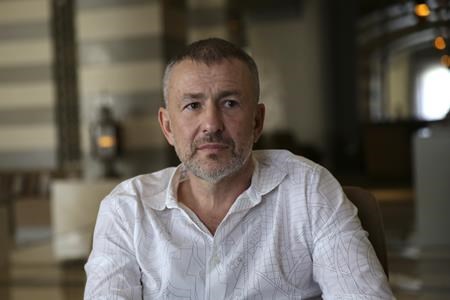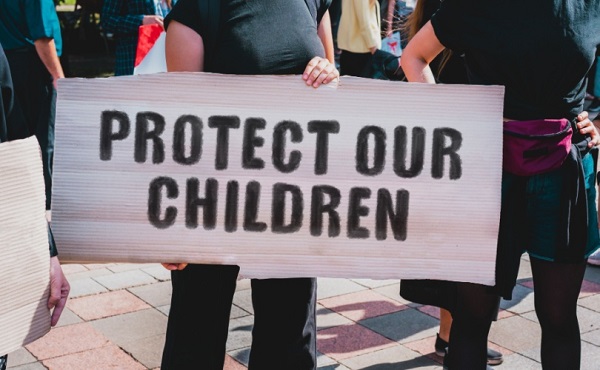Alberta
Russian billionaire couple claims Canadian sanctions are unjustified and unreasonable

Russian billionaire Andrey Melnichenko and his wife Aleksandra want to be taken off Canada’s sanctions list, claiming in Federal Court they’ve been wrongfully labelled as “elites and close associates” of the Russian regime.
The Melnichenkos filed two applications in the Federal Court of Canada in late March, seeking to quash a decision to place them under sanctions related to the war in Ukraine.
Court documents obtained by The Canadian Press reveal that the pair have been fighting their inclusion on Canada’s list of “designated persons” under its Russian sanctions regime since October 2022.
Back in February, the Trudeau government announced amendments to the Special Economic Measures (Russia) Regulations, which included placing the Melnichenkos on a list of 122 sanctioned individuals tied to the government of Russian President Vladimir Putin.
The couple claim the Canadian government has failed to provide them with any evidence to justify their inclusion on the list.
The list includes Russian elites and policymakers thought to be “engaged in activities that directly or indirectly facilitate, support, provide funding for or contribute to a violation or attempted violation of the sovereignty or territorial integrity of Ukraine.”
“Mr. Melnichenko does not have, and has not had, any association with the Government of Russia or President Putin,” Andrey Melnichenko’s application states. “He left Russia 20 years ago and has resided in Switzerland for the past 13 years. There is no reasonable basis for the Minister to believe otherwise.”
His wife, a former model and Serbian pop singer, claims she’s been wrongly targeted by Canadian sanctions, since she has no ties to Russia and doesn’t have any involvement in companies founded by her husband.
The couple’s Canadian lawyers, Scott Hutchison and Eleni Loutas with Henein Hutchison Robitaille LLP in Toronto, declined to comment on their cases.
Andrey Melnichenko’s public relations director, Alexander Byrikhin, did not immediately respond to an emailed request for comment.
Global Affairs Canada said in an emailed statement that it “cannot release information on individuals or entities listed under the Special Economic Measures (Russia) or comment on individual cases.”
“In response to Russia’s illegal and unjustifiable invasion of Ukraine, Canada has imposed hard-hitting sanctions against the Russian regime and those who enable it,” the statement said.
Aleksandra Melnichenko claims in her application that she’s a European citizen with “no connections to Russia whatsoever.”
She denies any involvement in two companies founded by her husband, fertilizer firm EuroChem, and SUEK, a coal company, both of which are owned by a trust administered in the European Union.
“She is merely a beneficiary of the discretionary trust managed by the independent trustee,” her application claims. “The latter is the legal owner of the named companies.”
In June 2022, EuroChem issued a “statement on ownership and control” following reports that Andrey Melnichenko had ceded ownership in the firm to his wife just before being sanctioned by the EU.
“EuroChem Group AG is not sanctioned, has never been sanctioned, and is free to continue with its important mission of supplying high-quality crop nutrients to world markets,” the statement said. “EuroChem is majority-owned and controlled by EU trustees of a trust, whose beneficiary, Aleksandra Melnichenko, has no majority ownership of, nor influence over, EuroChem. Therefore, EuroChem is not controlled by any sanctioned person.”
Aleksandra Melnichenko claims her “erroneous” inclusion on sanctions lists in the EU, Switzerland and Canada caused “difficulties for the companies’ operations worldwide, increasing the ongoing food and energy crisis.”
Andrey Melnichenko claims he’s been falsely portrayed as an “oligarch” in control of the companies, causing production disruptions at facilities in Europe after he was sanctioned by the EU.
His court application warns of similar “unintended consequences” in Canada, where the Russian sanctions list now includes more than 1,300 individuals.
It states that he’s not an oligarch but a “self-made businessman,” quoting a Forbes report referring to his fortune being made independently and free of ties to the Russian government under both Putin and Boris Yeltsin.
Melnichenko sits at number 58 on Forbes’ billionaires list with a net worth of more than $25 billion, which he amassed beginning in the early 1990s with a chain of currency exchange booths, before founding MDM Bank, and later EuroChem and SUEK.
“As has occurred in Europe, sanctioning Mr. Melnichenko could disrupt EuroChem and SUEK’s operations and detrimentally impact the global fertilizer supply which, in turn, has the potential to exacerbate the ongoing food shortage,” he claims in Federal Court.
Julia Webster, a Toronto-based international trade lawyer and partner at Baker McKenzie, said Canada’s approach to Russia contrasts with other countries currently under sanctions.
Unlike sanctions on Haiti, Myanmar, Iran and Sri Lanka, Canada’s sanctions on Russia represent a “true decoupling of economies,” she said, given the economic entanglements between western nations and Russia before its invasion of Ukraine.
She said Canada’s sanctions list mirrors that of allied nations.
“The sanctions are being implemented in co-ordination with Canada’s allies,” Webster said. “There is overlap on many of the prohibitions that are in place amongst the sanctions regimes between different countries and the people who are designated on those sanctions regimes, but there are also differences and Canada at this time seems to have actually one of the strictest regimes comparatively to its allies.”
In March 2022, the EU sanctioned Andrey Melnichenko, noting his attendance at a meeting held by Putin with Russian business leaders and oligarchs on the day of the invasion of Ukraine.
“The fact that he was invited to attend this meeting shows that he is a member of the closest circle of Vladimir Putin and that he is supporting or implementing actions or policies which undermine or threaten the territorial integrity, sovereignty and independence of Ukraine, as well as stability and security in Ukraine,” the EU said.
Shortly after Andrey Melnichenko was sanctioned in the EU, Italian authorities seized the couple’s $600-million “Sailing Yacht A,” but their other vessel, Motor Yacht A, valued at $300 million, avoided a similar fate by docking in the United Arab Emirates at the time.
In August 2022, the United Stated designated Melnichenko as a “Putin enabler,” pointing to his past involvement in Russia’s financial services sector.
“Listing carries serious social, economic and personal consequences,” the couple claims.
This report by The Canadian Press was first published April 16, 2023.
Darryl Greer, The Canadian Press
Alberta
New pipeline from Alberta would benefit all Canadians—despite claims from B.C. premier

From the Fraser Institute
The pending Memorandum of Understanding between the Carney government and the Alberta governments will reportedly support a new oil pipeline from Alberta’s oilsands to British Columbia’s tidewater. But B.C. Premier David Eby continues his increasingly strident—and factually challenged—opposition to the whole idea.
Eby’s arguments against a new pipeline are simply illogical and technically incorrect.
First, he argues that any pipeline would pose unmitigated risks to B.C.’s coastal environment, but this is wrong for several reasons. The history of oil transport off of Canada’s coasts is one of incredible safety, whether of Canadian or foreign origin, long predating federal Bill C-48’s tanker ban. New pipelines and additional transport of oil from (and along) B.C. coastal waters is likely very low environmental risk. In the meantime, a regular stream of oil tankers and large fuel-capacity ships have been cruising up and down the B.C. coast between Alaska and U.S. west coast ports for decades with great safety records.
Next, Eby argues that B.C.’s First Nations people oppose any such pipeline and will torpedo energy projects in B.C. But in reality, based on the history of the recently completed Trans Mountain Expansion (TMX) pipeline, First Nations opposition is quite contingent. The TMX project had signed 43 mutual benefit/participation agreements with Indigenous groups along its route by 2018, 33 of which were in B.C. As of March 2023, the project had signed agreements with 81 out of 129 Indigenous community groups along the route worth $657 million, and the project had resulted in more than $4.8 billion in contracts with Indigenous businesses.
Back in 2019, another proposed energy project garnered serious interest among First Nations groups. The First Nations-proposed Eagle Spirit Energy Corridor, aimed to connect Alberta’s oilpatch to a port in Kitimat, B.C. (and ultimately overseas markets) had the buy-in of 35 First Nations groups along the proposed corridor, with equity-sharing agreements floated with 400 others. Energy Spirit, unfortunately, died in regulatory strangulation in the Trudeau government’s revised environmental assessment process, and with the passage of the B.C. tanker ban.
Premier Eby is perfectly free to opine and oppose the very thought of oil pipelines crossing B.C. But the Supreme Court of Canada has already ruled in a case about the TMX pipeline that B.C. does not have the authority to block infrastructure of national importance such as pipelines.
And it’s unreasonable and corrosive to public policy in Canada for leading government figures to adopt positions on important elements of public policy that are simply false, in blatant contradiction to recorded history and fact. Fact—if the energy industry is allowed to move oil reserves to markets other than the United States, this would be in the economic interest of all Canadians including those in B.C.
It must be repeated. Premier Eby’s objections to another Alberta pipeline are rooted in fallacy, not fact, and should be discounted by the federal government as it plans an agreement that would enable a project of national importance.
Alberta
Premier Danielle Smith says attacks on Alberta’s pro-family laws ‘show we’ve succeeded in a lot of ways’

From LifeSiteNews
Recent legislation to dial back ‘woke progressivism’ is intended to protect the rights of parents and children despite opposition from the left.
Alberta Premier Danielle Smith took a shot at “woke progressivism” and detractors of her recent pro-family laws, noting that because wokeness went “too far,” the “dial” has turned in favor of parental rights and “no one” wants their “kid to transition behind their back.”
“We know that things went a little bit too far with woke progressivism on so many fronts and we’re trying to get back to the center, trying to get them back to the middle,” Smith said in a recent video message posted on the ruling United Conservative Party’s (UCP) official X account.
Smith, who has been battling the leftist opposition New Democratic Party (NDP) attacks on her recent pro-family legislation, noted how “we’ve succeeded in a lot of ways.”
“I think we have moved the dial on protecting children and the right of girls and women to participate in sports without having to face born male athletes,” mentioning that the Olympics just announced gender-confused athletes are not allowed to compete in male or female categories.
“I think we’re moving the dial on parental rights to make sure that they know what’s going on with their kids. No one wants their kid to be transitioned behind their back and not know. I mean, it doesn’t matter what your background is, you want to know what’s going on with your child.”
Smith also highlighted how conservatives have “changed the entire energy conversation in the country, we now have we now have more than 70 percent of Canadians saying they believe we should build pipelines, and that we should be an energy superpower.’
As reported by LifeSiteNews, Smith recently said her government will use a rare constitutional tool, the notwithstanding clause, to ensure three bills passed this year – a ban on transgender surgery for minors, stopping men from competing in women’s sports, and protecting kids from extreme aspects of the LGBT agenda – remain law after legal attacks from extremist activists.
Bill 26 was passed in December 2024, amending the Health Act to “prohibit regulated health professionals from performing sex reassignment surgeries on minors.”
Last year, Smith’s government also passed Bill 27, a law banning schools from hiding a child’s pronoun changes at school that will help protect kids from the extreme aspects of the LGBT agenda.
Bill 27 will also empower the education minister to, in effect, stop the spread of extreme forms of pro-LGBT ideology or anything else allowed to be taught in schools via third parties.
Bill 29, which became law last December, bans gender-confused men from competing in women’s sports, the first legislation of its kind in Canada. The law applies to all school boards, universities, and provincial sports organizations.
Alberta’s notwithstanding clause is like all other provinces’ clauses and was a condition Alberta agreed to before it signed onto the nation’s 1982 constitution.
-

 International2 days ago
International2 days agoBoris Johnson Urges Ukraine to Continue War
-

 Business21 hours ago
Business21 hours agoFederal major projects list raises questions
-

 Health1 day ago
Health1 day agoOrgan donation industry’s redefinitions of death threaten living people
-

 Great Reset2 days ago
Great Reset2 days agoRCMP veterans’ group promotes euthanasia presentation to members
-

 Daily Caller2 days ago
Daily Caller2 days agoEXCLUSIVE: Here’s An Inside Look At The UN’s Disastrous Climate Conference
-

 Artificial Intelligence1 day ago
Artificial Intelligence1 day agoGoogle denies scanning users’ email and attachments with its AI software
-

 Business2 days ago
Business2 days agoTaxpayers paying wages and benefits for 30% of all jobs created over the last 10 years
-

 Business2 days ago
Business2 days agoIs affirming existing, approved projects truly the best we can do in Canada?









